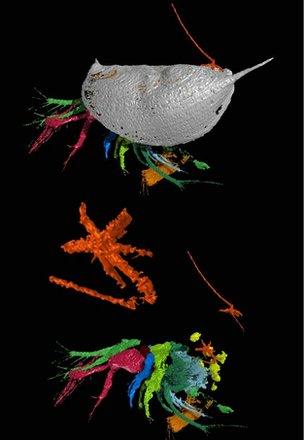- 9 hours ago
- Science & Environment
Researchers have discovered the 425-million-year-old remains of a new species of parasite - still clamped to the host animal it invaded.
The international team found the fossil at a site in Herefordshire.
Prof David Siveter, from the University of Leicester, said it had been "frozen in time" by a volcano that killed and preserved marine creatures at the site.
The discovery is published in the journal Current Biology.
The new species, which has been named Invavita piratica (meaning "ancient intruder" and "piracy"), belongs to a group of parasites known as tongue worms.
It is the ancient ancestor of 140 species of modern-day parasites that live within the respiratory system of their host.
"In fact, it's not a worm," said Prof Siveter. "It belongs to the broad group of animals we call arthropods."
This very large group includes insects, arachnids and crustaceans.
Invavita piratica, shown in orange in the image the team reconstructed, has a worm-like body, a head, and two pairs of limbs.
To produce their detailed 3D image - essentially a CT scan of the entire fossil - the researchers actually had to destroy the original specimen.
"We have to grind away each layer," Prof Siveter said, to scan every plane to build up a "virtual 3D fossil".
"The composition of the fossil is the same as the rock in which it lies, so we can't [separate them]," said Prof Siveter.
"But the virtual fossil we have now is just as good."
Prehistoric snapshot

It was only when the reconstruction emerged from the scan that the team realised what they had found; a moment Prof Siveter described as "like Christmas morning".
He told BBC News this was a "very rare example of a parasite in deep time".
"And it tells us something about the origin of this important group of parasites."
"Most modern tongue worms infect vertebrates - including humans - but what we have is a tongue worm that infested an invertebrate [marine] animal.
"So it's telling us about the origin of their lifestyle - how they moved from a water-based environment to a land-based environment."
The exact location of the fossil find is being kept secret to protect it.
Prof Siveter said it was a "treasure trove of biological information".
While most fossil beds contain the preserved remains of shells and bones, this site also has preserved soft tissues.
"These animals were still swimming in a sea that covered southern Britain 425 million years ago," he said.
"A volcano erupted, possibly in south-west Ireland, and ash rained down through the sea and killed the animals.
"The chemical changes literally froze the animals in time - it's almost as if someone came along took a photograph."
Tim Littlewood, head of life sciences at the Natural History Museum, in London, said: "Finding fossil parasites is incredibly difficult, but finding them in situ, within their host, is remarkable."
He told BBC News: "This triple whammy of finding a fossilised parasite with its host, the first fossilised adult pentastomid (or tongue worm), and [finding a new host for the parasite] is enough to make any self-respecting palaeontologist or parasitologist salivate."

No comments:
Post a Comment